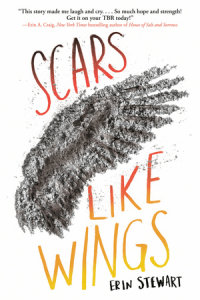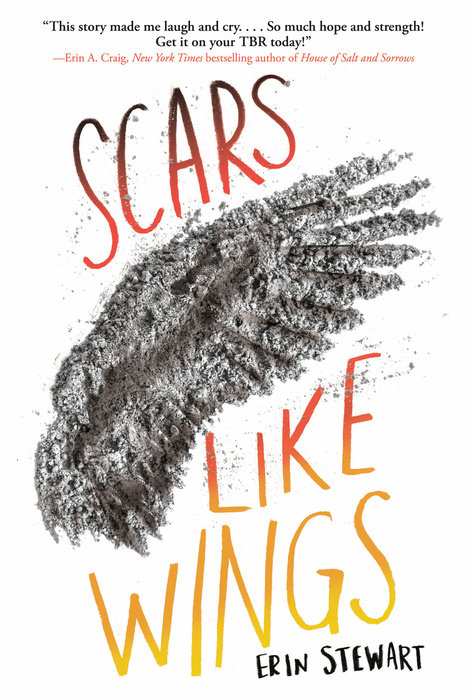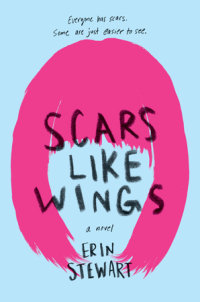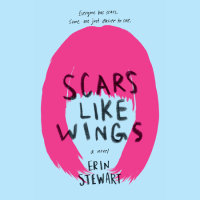Scars Like Wings
Relatable, heartbreaking, and real, this is a story of resilience--the perfect novel for readers of powerful contemporary fiction like Girl in Pieces and Every Last Word.
Before, I was a million things. Now I'm only one. The Burned Girl.
Ava Lee has lost everything there is to lose: Her parents. Her best friend. Her home. Even her face. She doesn't need a mirror to know what she looks like--she can see her reflection in the eyes of everyone around her.
A year after the fire that destroyed her world, her aunt and uncle have decided she should go back to high school. Be "normal" again. Whatever that is. Ava knows better. There is no normal for someone like her. And forget making friends--no one wants to be seen with the Burned Girl, now or ever.
But when Ava meets a fellow survivor named Piper, she begins to feel like maybe she doesn't have to face the nightmare alone. Sarcastic and blunt, Piper isn't afraid to push Ava out of her comfort zone. Piper introduces Ava to Asad, a boy who loves theater just as much as she does, and slowly, Ava tries to create a life again. Yet Piper is fighting her own battle, and soon Ava must decide if she's going to fade back into her scars . . . or let the people by her side help her fly.
An Excerpt fromScars Like Wings
One year after the fire, my doctor removes my mask and tells me to get a life.
He doesn’t use those exact words, of course, because he’s paid to flash around lots of medical-degree terms like reintegration and isolation, but basically, the Committee on Ava’s Life had a big meeting and decided I have wallowed long enough.
My postburn pity party is over.
Dr. Sharp examines my skin grafts to make sure I haven’t inadvertently grown batwings in my armpits since our last monthly pat-down. Scars can be screwy little suckers, and since my body is 60 percent screwed up, it takes Dr. Sharp a full twenty minutes to check me over. The tissue paper covering the vinyl exam table crinkles beneath me as my aunt Cora watches attentively from the sidelines, scribbling notes in her gargantuan “Ava’s Recovery” binder while her eyes follow Dr. Sharp.
He removes the bandana from my head and then my clear plastic mask, his fingers grazing my scars.
“Everything’s healing beautifully,” he says, without even a hint of irony. The coldness of his fingers registers above my eyes but fades as he moves to the thicker grafts around my mouth.
“Well,” I say, “you can put lipstick on a pig, but it’s still a p--”
“Ava!” gasps Cora, who is not only my aunt but also the self-appointed CEO of the aforementioned committee on my life.
Dr. Sharp shakes his head and laughs, revealing two deep dimples on either side of his smile, which only makes him even more like one of those McHottie doctors on TV who bang each other in the on-call room between saving lives. I blame his smoldering eyes and strong jawline for the butterfly swarm in my stomach every time he touches my grafts. It also doesn’t help that I’m keenly aware he has seen me naked approximately nineteen times. Sure, it’s on an operating-room table, but naked is naked, even covered with gauze and nineteen surgeries’ worth of scars.
But we never address that awkward elephant in the room, just like I never mention the fact that he once literally took a chunk of my butt and stretched it across my face to make a new forehead.
Dr. Sharp hands me a small, salon-style mirror so I can admire his handiwork.
“No thanks,” I say, giving it back.
“Still having trouble looking?”
“Unless I grew a new face overnight, I already know what I’m going to see.”
Dr. Sharp nods while typing a note into my chart, and I sense a forthcoming committee meeting about my resistance to reflective surfaces. It’s not like I haven’t seen my face. I know how I look. I choose not to keep looking.
With a dimply smile, Dr. Sharp holds up my plastic mask.
“I think you’ll be happy to hear that you can get rid of this little guy.”
Cora squeals and awkwardly side-hugs me, careful not to apply too much pressure to disrupt the all-important healing process.
“You couldn’t have given us a better gift today, Dr. Sharp. It’s been a year, this week actually, since--” Cora pauses, and I can almost see her brain trying to come up with the right words.
“The fire,” I jump in. “One year since the fire.”
Dr. Sharp hands me the mask, which has been my constant companion every day, twenty-three hours a day for that year. Its one job: keep my face flat as it heals so my scars don’t bulge out in fleshy blobs. The doctors and nurses reassure me constantly that the mask has made my scars heal so much better, although I’m unconvinced it can get much worse than the patchwork of discolored grafts I call my face.
“You’ll still need to wear the body-compression garments until we’re sure the scars won’t interfere with your movements,” Dr. Sharp says. “But I do have one more piece of good news for you.”
Cora gives him the slightest nod, which tells me that whatever comes next is a direct result of an Ava’s Life meeting. My invitation must have gone straight to spam.
“Now that you don’t have to wear the mask, I am authorizing--and strongly recommending--that you return to school,” he says.
I flip the mask around in my hand without looking up.
“Yeah, that’s a hard pass,” I say. “But thanks.”
Jumping off the sidelines, Cora lays her massive binder by the sink and half sits on the patient chair with me, lightly tapping my thigh.
“Ava, I know you’re bored with those online classes, and you’re always saying how you wish things could go back to normal.”
Normal.
Right. Old normal. Ava Before the Fire normal. Normal normal.
“That’s Never. Going. To. Happen,” I say. “I’m not going to waltz back into my old school and have everything be the same.”
“You could go to the school by our house, like we’ve talked about. Or pick any school you want,” Cora says, undeterred. “You know, a fresh start? Make new friends and begin a life here.”
“I’d rather die,” I mumble.
I’ve been doing fine at home taking classes online in my pajamas. Where no one can see me. Where no one can point and stare and whisper as I walk by like I’m deaf as well as deformed.
“I know you don’t mean that,” Cora says. “You’re lucky to be alive.”
“Right. I’m a human rabbit’s foot.”
Why am I the lucky one because I survived? Mom, Dad, and my cousin Sara are probably dancing through a celestial meadow somewhere or happily reincarnated as monkeys in India while I face an endless loop of surgeries and doctors and stares from strangers.
But I can’t compete with tombstones. Death trumps suffering every time.
“If it were Sara, I’d want her to live a full life,” she says. “And I know your mother would want you to be happy.”
Her attempt to use dead people to win this argument irks me.
“I’m not Sara. And you’re not my mother.”
Cora turns away from me, and so does Dr. Sharp, pretending to concentrate especially hard on the computer screen rather than acknowledge the tension that fills the exam room like smoke. I hate that Dr. Sharp is here for this embarrassing toddler tantrum, but he’s partly to blame for blindsiding me with this development.
Cora sniffles quietly, and I wish I could take back my jab. She didn’t ask to be my makeshift mother any more than I asked to be her understudy offspring. We’re both trying to navigate this sick twist of “luck” the universe threw our way.
Dr. Sharp clears his throat. “Ava, the fact is, we’re concerned about your level of isolation. Reintegration is a major part of your healing process, and we all think it’s time to start,” he says. I refrain from asking him who this mysterious “all” includes, since my concerning hermit status is news to me. “What if you go to school for a trial period, and then we reassess our reintegration strategy? Say two weeks?”
Cora looks at me hopefully, tears still wetting her eyes, as the guilt of the lucky creeps into my chest. The guilt of the one who lived.



